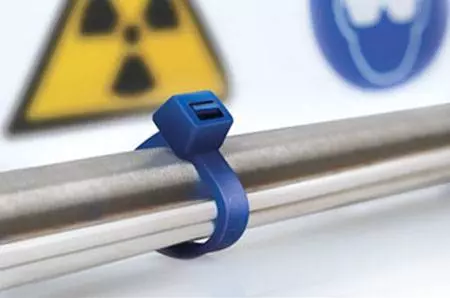Automation
Cable Management Solutions in Automation
Overview of Automation Industry Wiring Applications
The history of industrial automation began with simple conveyor belts that moved parts along assembly lines, enabling machines to perform basic tasks and reduce physical labor. Today, industrial automation refers to the integration of machines, actuators, sensors, processors, and networks within industrial environments, aiming to achieve automated production. Over the past three decades, industrial automation has steadily transformed factories, warehouses, and agriculture. However, its adoption was often hindered by high costs, financing challenges, and limited versatility. In the Industry 4.0 era, advancements in automation technology, artificial intelligence (AI), and machine learning have made automation solutions more accessible than ever. The global industrial automation and control systems market size is projected to reach USD 206.33 billion in 2024, with a compound annual growth rate (CAGR) of 10.8% forecasted for 2025 to 2030.
Key Insights
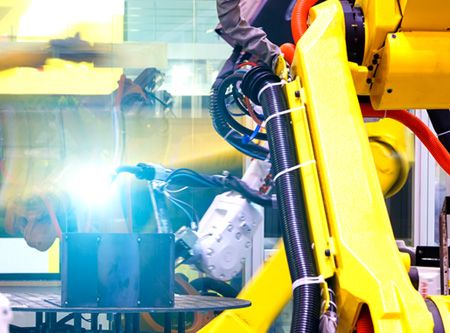 | Industrial automation is becoming a prerequisite for businesses to remain competitive. In today’s fiercely competitive global markets, manufacturers and industrial facilities must operate at maximum efficiency to stay profitable. Automation offers numerous benefits, including increased productivity, reduced waste, cost savings, enhanced quality control, improved employee safety, and better data collection and analysis capabilities. Companies that embrace automation gain a competitive edge. The future trend indicates that automation will no longer be optional but essential to maintaining competitiveness. In the fast-paced business environment, the ability to rapidly adopt automation is crucial. Companies capable of quickly implementing automation solutions can better address changing market demands, shorter product life cycles, and unexpected production disruptions, such as power outages or downtime. Traditional industrial robots were primarily affordable for large enterprises with significant resources. However, collaborative robots (cobots) are transforming the game for small and medium-sized businesses (SMBs). Unlike industrial robots, cobots are designed to work safely alongside human operators, eliminating the need for complex safety barriers. Cobots create a more collaborative work environment and can be easily deployed in limited spaces to automate specific tasks. |
Wiring Solutions for Automation Systems
Automation equipment involves multiple systems, such as control systems, sensing systems, actuator systems, human-machine interfaces (HMI), drive systems, communication systems, safety systems, vision systems, and power supply systems. Proper wiring management is essential to protect, organize, and secure cables, ensuring stable and safe operation. Each system requires specific wiring components tailored to its needs. Effective wiring management improves system reliability and safety. Key components and their applications include:
| Product Illustration | Applications |
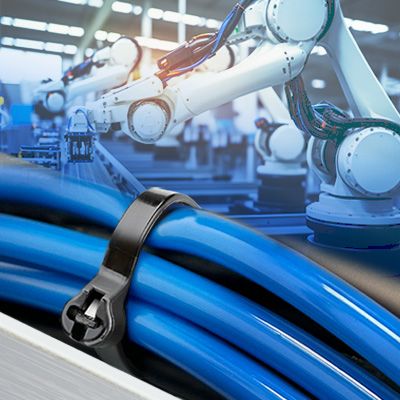
Anti-Vibration Cable Ties/ Steel Barb Cable Ties (Product Link) |
Recommendation: For actuator systems requiring precise cable locking to withstand vibrations, steel-tooth cable ties are ideal. They ensure secure locking, avoid displacement from vibrations, and resist wear over time. Steel-tooth ties are also suited for environments with grease or hydraulic systems, requiring oil-resistant, non-slip locking mechanisms. |
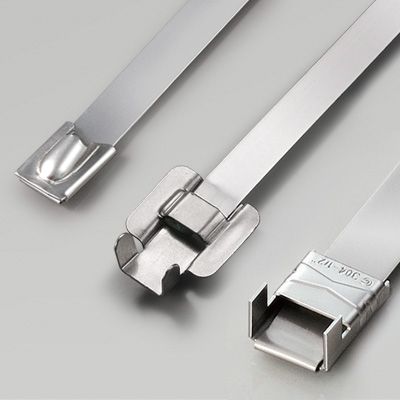
Stainless Steel Cable Ties (Product Link) | |
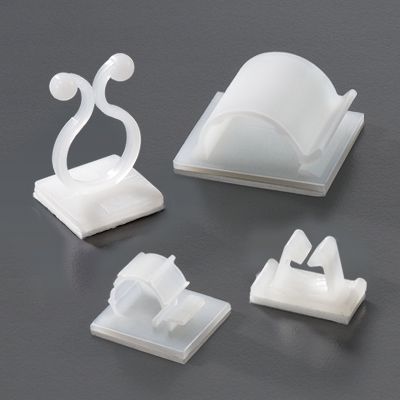
Adhesive-Backed Cable Tie Mounts (Product Link) | Features: Strong adhesive backing for quick installation on smooth surfaces without drilling. Applications: Fixing control system cables to panels or frames; organizing HMI interface cables behind control panels for a clean look and enhanced user experience. |
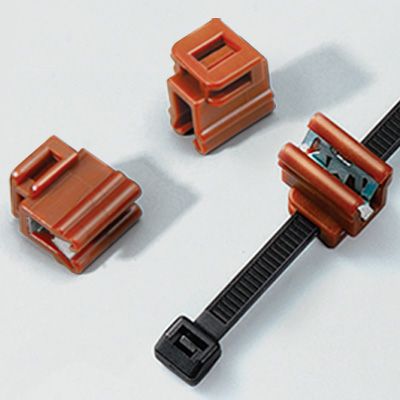
Edge Clip Cable Tie Mounts (Product Link) | Features: Easily clips onto panel or frame edges, requiring no drilling or adhesive. Applications: Organizing HMI interface cables for displays and control panels, keeping the setup clean and efficient. |
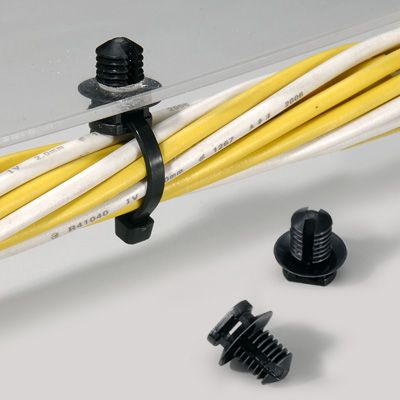
Fir-Tree Cable Tie Mounts (Product Link) | Features: A fir-tree-shaped insertion peg that secures firmly into pre-drilled holes. Applications: Automotive and aerospace systems, securing cables to metal or plastic panels. |
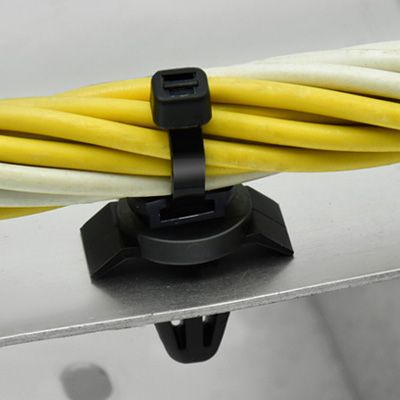
Panel Mount Cable Tie Holders (Product Link) | Features: Designed for cabinet interiors, often compatible with DIN rails or specific mounting holes. Applications: Arranging cables in data processing and storage systems, such as server cabinets, improving airflow and simplifying maintenance. |
Innovative Solutions: Metal Pawl Cable Ties
Hua Wei Industrial Co., Ltd. introduces a new series of steel barb cable ties offering unmatched performance, including high precision, stability, resistance to vibration, moisture, temperature fluctuations, oil resistance, anti-slip features, corrosion, salt spray, and UV radiation. Tailored materials and designs are available to meet the specific needs of various industries, ensuring unparalleled quality in wiring management while maintaining cost efficiency.
Explore Our Steel Barb Cable Ties
For further information, feel free to contact us for personalized solutions.
Why Choose Hua Wei?
- Over 45 years experiences in designing and manufacturing of cable ties.
- Core technology: Precise stamping and molding injection.
- Rich experience and specialty of precise molding in engineering plastic Polyamide 6,6
- Advanced molding facilities and outstanding R&D teamwork
- Our in-house molding capability allows great flexibility in production and enables us to develop products collaboration with our clients.
- Providing customize packaging design and work in process with your brand.
- Stable supply chain with on-time delivery.
Remarks: Hua Wei is a professional OEM factory, followed the MOQ for each order.
Featured product
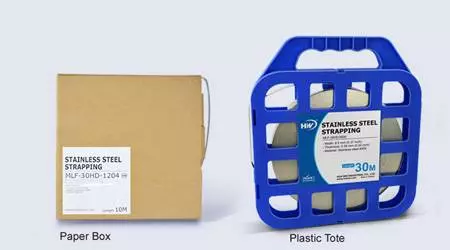 Hot
Hot
Stainless Steel Ties
 Hot
Hot
Stainless Steel Ties
With high resistance to various corrosive agents such as acids, alkali, UV, and rust, …
Read More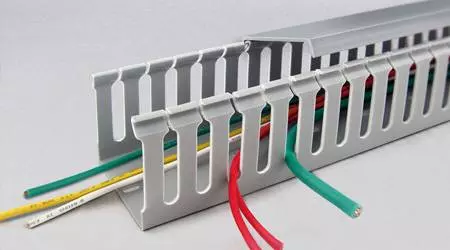 Hot
Hot
Wire Ducts
 Hot
Hot
Wire Ducts
The premium solution for routing and hiding wires in control panels.
Read More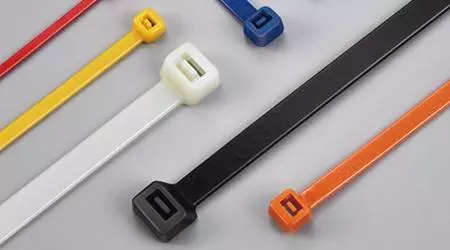 Hot
Hot
Standard Cable Ties
 Hot
Hot
Standard Cable Ties
Available materials include heat stabilized, weather resistant and flame retardant polymers,...
Read More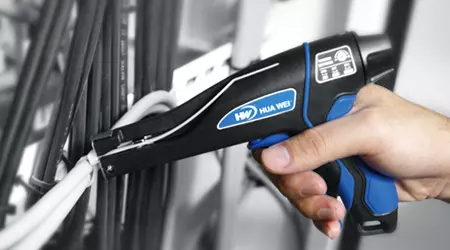 Hot
Hot
(GIT-703) Cable Tie Tensioning Tool
 Hot
Hot
(GIT-703) Cable Tie Tensioning Tool
The new cable tie installation tool can fasten and cut nylon cable ties quickly & safely
Read More

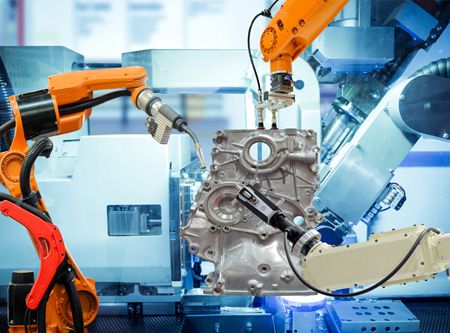
.jpg?v=7ec45b5f)
